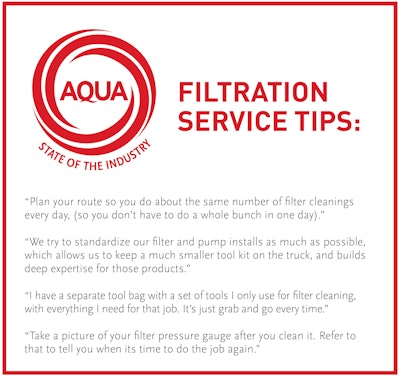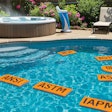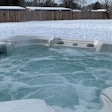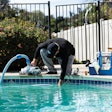
This edition of Filtration Nation asks three questions of pool and spa filtration expert Richard Medina.
AQUA Editor Scott Webb: Over the last 23 years, I’ve written dozens of pool filter stories, but I’ve never talked about antimicrobial media. All this time I’ve wondered — why is antimicrobial media even a thing? I mean, your water’s got chlorine in it — isn’t that already killing the microbes before they reach the filter?
Rich Medina: Yes, chlorine is sanitizing the pool, but as we know, there are times when there’s less free chlorine in the water than others, maybe not enough to kill all the algae or bacteria.
At the same time, invariably, you wind up trapping on the filter media some of the stuff that the algae feed on, and potentially that is a growth vector for algae that has survived [poorly] chlorinated water. At that point, you do have the potential for growing something on the filter media that is somewhat resistant to chlorine.
So from that perspective, antimicrobial media provides some peace of mind to the user — it helps prevent you from harboring bacteria and algae on the filter.
Just to be clear, anti-microbial media is not going to actively go after the bacteria that is in the water, or leach anything into the water. It’s something that prevents the growth of mildew or bacteria on the surface of the filter.
SW: Okay, say it did start growing there, would it kind of block the filter?
RM: Yes, you would see a reduction of the effective flow. Algae is a pernicious organism that would basically blind off the cartridge media to an extent. I should add that not all antimicrobial media are identical. Some are dip-coated, and some have the antimicrobial agent built right into the fiber — it doesn’t wash off or anything like that. It’s in the fiber itself.
SW: Here’s another question I’ve never asked but always wondered about. The basic technology of pool filtration is still more or less the same as we’ve had for ages. Do you think that’ll ever change? Will we ever get some kind of a really new way of achieving pool filtration?
RM: Yes, I really think so. There’s a lot of technology that’s brewing out there. Also, I personally believe our overall energy paradigm could change — that we could solve some of the energy challenges we’re facing right now. If that happened, that would change how we approach filtration.
Sooner or later, I think we’ll find a solution to our broad energy problems. For instance, if battery technology continues to advance, the ability to store large amounts of energy — whether it’s from solar, wind or some other source — would definitely allow us to capture more than we need.
If that happened, clever people in the pool and spa industry would figure out a way to harness this abundance of energy and come up with a new kind of filtration system. If you think about it, all you’re doing is moving molecules around to take debris out of water. There are a lot of ways you could do that if you had enough energy at your disposal.

Richard Medina is an engineer whose decades-long career in pool filtration spans all three major types of filter media — D.E., sand and cartridge. He was senior vice president of engineering at Pleatco for 13 years, and vice president / general manager at Columbia Pool Filter 15 years before that. He currently works as a filtration consultant for OnCore Filtration in Manning, S.C.












































